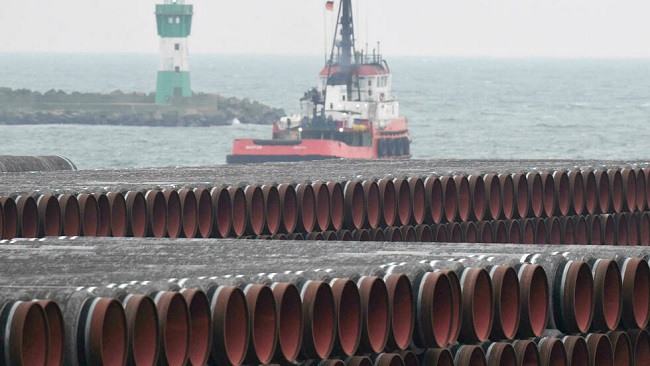Another Merkel Victory: US, Germany agree deal on Russia’s Nord Stream 2 gas pipeline to Europe
The United States and Germany have reached a deal that will allow the completion of a controversial Russian gas pipeline to Europe without the imposition of further U.S. sanctions, a senior U.S. official said Wednesday.
Under Secretary of State for Political Affairs Victoria Nuland told Congress that the two governments would shortly announce details of the pact that is intended to address U.S. and eastern and central European concerns about the impact of the Nord Stream 2 project.
However, there is strong bipartisan opposition to the pipeline in Congress as well as in Ukraine and Poland, which fear Nord Stream 2 will undermine European energy security. Like the Trump administration before it, the Biden administration also opposes the pipeline but it insists that sanctions won’t stop it.
Nuland, the third-ranking U.S. diplomat, told the Senate Foreign Relations Committee that the U.S. and Germany would release a joint statement later Wednesday regarding the pipeline. She said Washington and Berlin had committed to imposing sanctions on Russia and German companies should Moscow use the pipeline as a political weapon.
Nuland did not elaborate although congressional aides briefed on the outlines of the deal said Tuesday it would allow the completion of the Nord Stream 2 pipeline without either Germany or Russia facing new U.S. sanctions. In return, the U.S. and Germany will make certain concessions to Ukraine and Poland, they said.
Nuland categorically denied reports that Ukraine had been warned against publicly complaining about the agreement and noted that the State Department’s counselor, Derek Chollet, was visiting both Kyiv and Warsaw this week to inform them of the deal. Also Wednesday, the White House announced that President Joe Biden would welcome Ukrainian President Volodymyr Zelenskyy to the White House on Aug. 30.
“The visit will affirm the United States’ unwavering support for Ukraine’s sovereignty and territorial integrity in the face of Russia’s ongoing aggression in the Donbas and Crimea, our close cooperation on energy security, and our backing for President Zelenskyy’s efforts to tackle corruption and implement a reform agenda based on our shared democratic values,” the White House said in a statement.
The Nord Stream 2 project has posed a major foreign policy dilemma for the Biden administration. U.S. officials from both parties have long feared that it would give Russia too much power over European gas supplies, potentially shutting off gas to Russian adversaries Ukraine and Poland. But the pipeline is almost completed and the U.S. has been determined to rebuild ties with Germany that were damaged during the Trump administration.
Biden’s approach to Ukraine is also a sensitive political subject. Former President Donald Trump’s attempt to pressure Zelenskyy to dig up dirt on Biden and his son led to Trump’s first impeachment. He was later acquitted by the Senate. Nord Stream 2 has been a topic of intense debate between U.S. and German officials for some time and it was a major agenda item during Biden’s meeting with German Chancellor Angela Merkel last week. Merkel supports the pipeline and Biden has suggested that punishing Germany for that support would be counterproductive to broader U.S. interests.
But like the Trump administration before it, the Biden administration regards the Nord Stream 2 project as a threat to European energy security and has imposed sanctions on some of those involved in building it.
Nuland said the U.S. continues to oppose the pipeline but said that Biden had waived sanctions against the German company constructing the pipeline and its top executives because the penalties would have been counterproductive.
She and others have defended the waivers, saying they can be rescinded at any time and that that threat actually gives the U.S. more leverage. That argument has been scoffed at by pipeline opponents.
Poland, Ukraine and other eastern and central European countries bypassed by the pipeline are concerned that Russia will use gas supplies as a political weapon. Lawmakers from both sides of the aisle in Congress and some members of the administration are sympathetic to that position.
Under the terms of the expected U.S.-Germany agreement, Ukraine would get $50 million in green energy technology credits, a guarantee of repayment for gas transit fees it will lose by being bypassed by the pipeline through 2024, and a pledge from both Germany and the U.S. that sanctions will be revisited should Russia use the gas as a political weapon, according to the congressional aides.
In a nod to Poland, Germany will also agree to sign onto the so-called “Three Seas Initiative,” an EU and U.S.-promoted scheme that aims to boost investment, infrastructure development and energy security among the countries bordering the Baltic, Black, and Adriatic seas, according to the aides.
Source: AP





